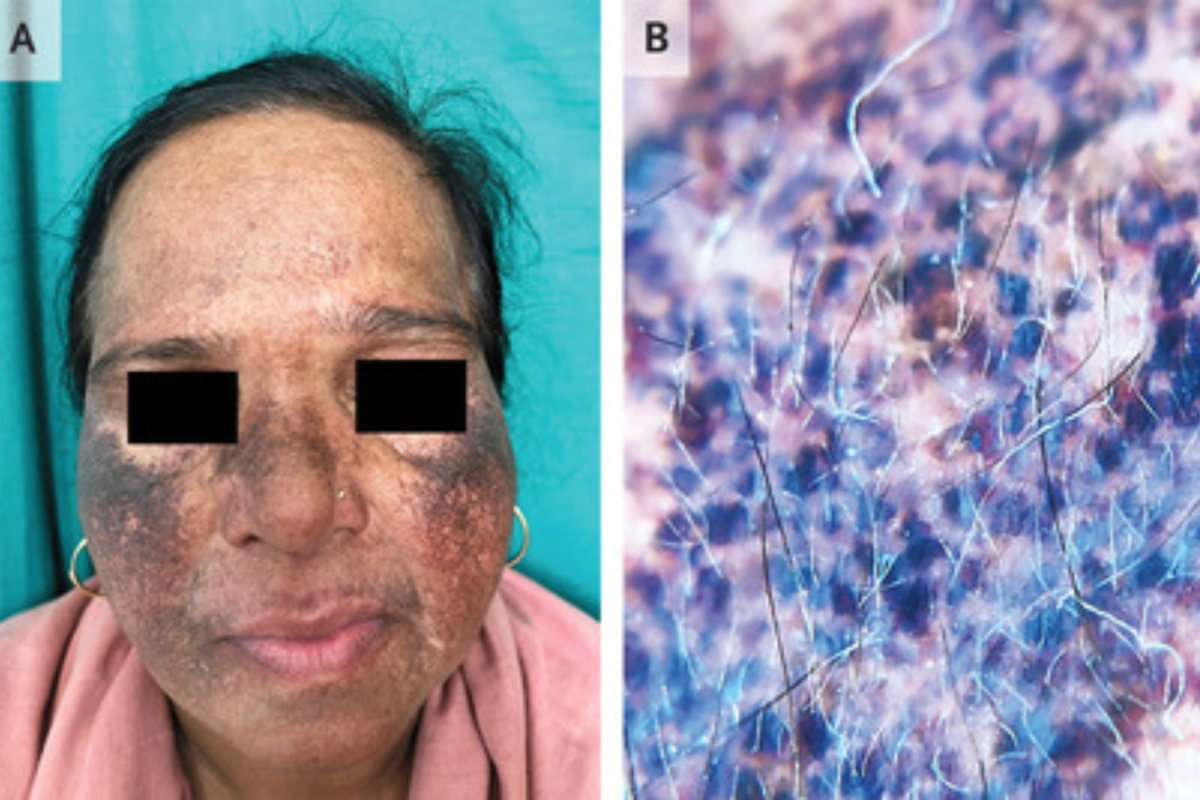A woman's skin has turned a bizarre blue-brown color after using skin-lightening cream.
This condition, known as exogenous ochronosis, had been affecting the 55-year-old patient for a year before she came into the hospital in Vadodara, India.
The woman has been applying a skin-lightening cream containing the skin-bleaching agent hydroquinone to treat patches of hyperpigmentation or melasma on her cheeks. However, now those regions have turned blue-brown, as shown by a case report in the New England Journal of Medicine.

"She had started applying a skin-lightening cream containing hydroquinone to her face daily to treat melasma," authors Nikita Patel and Hiral Shah of Government Medical College Baroda, India, wrote in the case study.
"On physical examination, bluish-brown patches with background erythema [skin reddening] and telangiectasias [widened blood vessels] were observed on the cheeks, nasal bridge, and perioral region [around the mouth], with lesser involvement on the forehead."
Exogenous ochronosis is a type of dermatitis caused by the application of hydroquinone or phenols to the skin. When skin affected by the condition is viewed under a microscope, it appears yellowish-ochre in color but seems blue-brown with the naked eye due to the scattering of light.
"It is the delayed effect of prolonged application of hydroquinone that on photo- oxidation, there is local competitive inhibition of the enzyme homogentisic oxidase by hydroquinone, which leads to local accumulation of homogentisic acid and its metabolic products that polymerizes and binds to connective tissue macromolecules to form the so-called typical ochronotic pigment in the papillary dermis, further destroying the collagen and elastic fibers," Patel said.
"This deposition is in dermis, so the hyperpigmentation is difficult to treat."
Hydroquinone has been banned in cosmetic creams in the European Union since 2000 due to its potential side effects and was nearly banned by the FDA in 2006. Around 10 to 15 million skin-lightening products are bought annually worldwide, with Japan having one of the largest markets for the products.
Using hydroquinone for longer increases the risk of developing exogenous ochronosis, especially if used in areas of the body that are exposed to the sun. It can be very hard to get rid of, with most treatments being preventative. Some studies have found that a Q-switched alexandrite (755 nm) laser could be used to treat the condition.

"Exogenous ochronosis is challenging to treat and may not be reversible. Counseling regarding the importance of photoprotection and cessation of the use of the skin cream was given to the patient. A topical emollient and retinoid gel were also prescribed," the authors explain.
However, two months after coming into the hospital, the woman saw very little change in the level of pigmentation of her skin.
"At 2 months of follow-up, the patient had minimal abatement of the hyperpigmentation," the authors wrote.
Do you have a tip on a science story that Newsweek should be covering? Do you have a question about skin? Let us know via science@newsweek.com.
Update 1/26/24, 12:13 p.m. ET: This article was updated with comment from Nikita Patel.
Uncommon Knowledge
Newsweek is committed to challenging conventional wisdom and finding connections in the search for common ground.
Newsweek is committed to challenging conventional wisdom and finding connections in the search for common ground.
About the writer
Jess Thomson is a Newsweek Science Reporter based in London UK. Her focus is reporting on science, technology and healthcare. ... Read more
To read how Newsweek uses AI as a newsroom tool, Click here.





